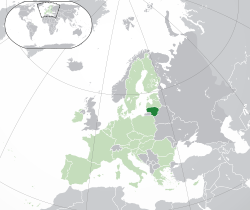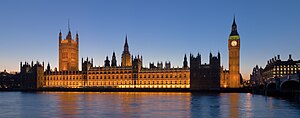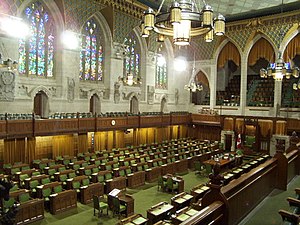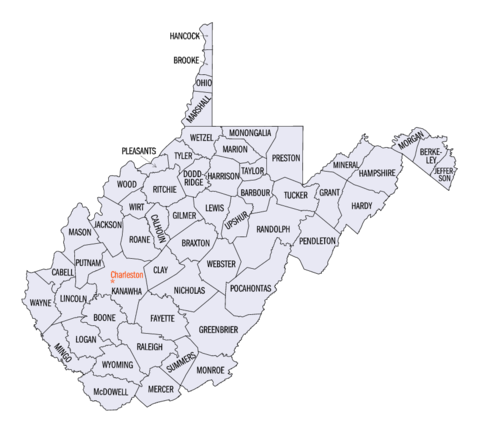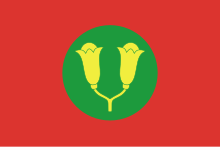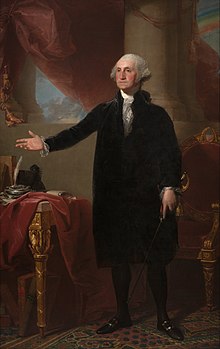Portal:Politics
| Main | Topics and categories | Tasks and projects |
The Politics portal
Politics (from Ancient Greek πολιτικά (politiká) 'affairs of the cities') is the set of activities that are associated with making decisions in groups, or other forms of power relations among individuals, such as the distribution of resources or status. The branch of social science that studies politics and government is referred to as political science.
It may be used positively in the context of a "political solution" which is compromising and non-violent, or descriptively as "the art or science of government", but also often carries a negative connotation. The concept has been defined in various ways, and different approaches have fundamentally differing views on whether it should be used extensively or in a limited way, empirically or normatively, and on whether conflict or co-operation is more essential to it.
A variety of methods are deployed in politics, which include promoting one's own political views among people, negotiation with other political subjects, making laws, and exercising internal and external force, including warfare against adversaries. Politics is exercised on a wide range of social levels, from clans and tribes of traditional societies, through modern local governments, companies and institutions up to sovereign states, to the international level.
In modern nation states, people often form political parties to represent their ideas. Members of a party often agree to take the same position on many issues and agree to support the same changes to law and the same leaders. An election is usually a competition between different parties.
A political system is a framework which defines acceptable political methods within a society. The history of political thought can be traced back to early antiquity, with seminal works such as Plato's Republic, Aristotle's Politics, Confucius's political manuscripts and Chanakya's Arthashastra. (Full article...)
Selected article
The Ordinances of 1311 were a series of regulations imposed upon King Edward II by the peerage and clergy of the Kingdom of England to restrict the power of the king. The twenty-one signatories of the Ordinances are referred to as the Lords Ordainers. English setbacks in the Scottish war, combined with perceived extortionate royal fiscal policies, set the background for the writing of the Ordinances in which the administrative prerogatives of the king were largely appropriated by a baronial council. The Ordinances reflect the Provisions of Oxford and the Provisions of Westminster from the late 1250s, but unlike the Provisions, the Ordinances featured a new concern with fiscal reform, specifically redirecting revenues from the king's household to the exchequer. Just as instrumental to their conception were other issues, particularly discontent with the king's favourite, Piers Gaveston, whom the barons subsequently banished from the realm. Edward II accepted the Ordinances only under coercion, and a long struggle for their repeal ensued that did not end until Thomas of Lancaster – the leader of the Ordainers – was executed in 1322.
Featured picture
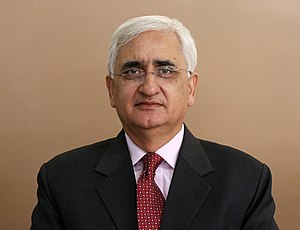
Salman Khurshid (born 1 January 1953) is an Indian politician belonging to the Indian National Congress, a lawyer, and a writer who has been elected from Farrukhabad Lok Sabha constituency in the General Election of 2009. He belongs to the Farrukhabad area. He is presently the Cabinet Minister of the Ministry of Law and Justice and Ministry of Minority Affairs.
Selected quote
Selected biography
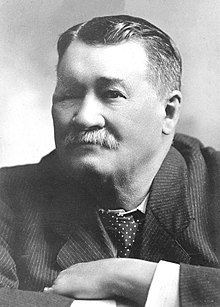
Leverett George DeVeber (sometimes spelled De Veber) (February 10, 1849 – July 9, 1925) was a Canadian politician who served as Member of the Legislative Assemblies of Alberta and the North-West Territories, minister in the government of Alberta, and member of the Senate of Canada. Born in New Brunswick and trained as a physician, he joined the North-West Mounted Police and came west, eventually settling in Lethbridge after leaving the police force. He represented Lethbridge in the North-West Legislative Assembly from 1898 until 1905, when Lethbridge became part of the new province of Alberta. He was appointed Minister without Portfolio in Alberta's first government, but resigned four months later to accept an appointment to the Senate, where he remained until his death.
Did you know (auto-generated) -

- ... that advertisements for Road 96 were taken down by Facebook for being too political?
- ... that a political action committee paid $132,000 to former First Lady Melania Trump's fashion stylist for strategy consulting?
- ... that Presidential Ballots, 1836–1892 was reviewed by Richard P. McCormick, who wrote that it "should stimulate a host of studies in the little-explored field of American political behavior"?
- ... that Jessica Mutch McKay hosted debates between the leaders of New Zealand's two major political parties?
- ... that after a career as political journalist, Peter Merseburger wrote biographies of Der Spiegel founder Rudolf Augstein and chancellor Willy Brandt?
- ... that before she was elected to the Parliament of Armenia, Maria Karapetyan spray-painted political graffiti on the streets of Yerevan in support of Nikol Pashinyan?
More did you know...
- ...that the first phase of Mitt Romney's 2012 U.S. presidential campaign was announced via a video message?
- ...that the Zimbabwe Human Rights NGO Forum recorded over 1,200 violations of human rights in Zimbabwe by the law enforcement agencies from 2001 to September 2006?
- ...that the ideology of the Romanian National Renaissance Front has been described as "operetta fascism"?
- ...that in the 1984 Brown v. Hotel and Restaurant Employees case, the U.S. Supreme Court upheld a New Jersey gaming law requiring union leaders to be of good moral character?
- ...that co-founder of the Saudi Civil and Political Rights Association Mohammed al-Bejadi spent most of 2011 in prison?
- ...that Roman embassies to China are reported in Chinese historical accounts from as early as 166?
In this month
- May 5, 2005 – A General Election in the United Kingdom sees Tony Blair's Labour government returned to office with a reduced majority of 66.
- May 14, 1948 – The Declaration of Independence of Israel is made.
- May 18, 1948 – The first Legislative Yuan of the Republic of China officially convenes in Nanking.
News and Current events
- August 11: 4 local government areas in New South Wales, Australia locked down after COVID-19 case
- August 11: Australia: AstraZeneca vaccine access expanded by Victorian government
- August 1: Australia: Victorian lockdown lifted
- July 29: Tunisia's president dismisses prime minister, suspends parliament
- July 25: Australia: Wikinews interviews Reg Kidd, mayor of the City of Orange, about COVID-19 lockdown and local government
- July 23: South Australia enters week-long lockdown to contain COVID-19 Delta variant spread
- July 21: Technological University Dublin senior lecturer Dr Lorcan Sirr speaks to Wikinews on housing market in Ireland
- July 21: Three rural councils in New South Wales, Australia enter 7-day lockdown
- July 21: Australia: Victoria lockdown extended by a week with 85 active cases recorded
- July 15: California governor signs new state budget, eligible Californians to get stimulus payments
Topics and categories
General images
Related portals
Associated Wikimedia
The following Wikimedia Foundation sister projects provide more on this subject:
-
Commons
Free media repository -
Wikibooks
Free textbooks and manuals -
Wikidata
Free knowledge base -
Wikinews
Free-content news -
Wikiquote
Collection of quotations -
Wikisource
Free-content library -
Wikiversity
Free learning tools -
Wiktionary
Dictionary and thesaurus





